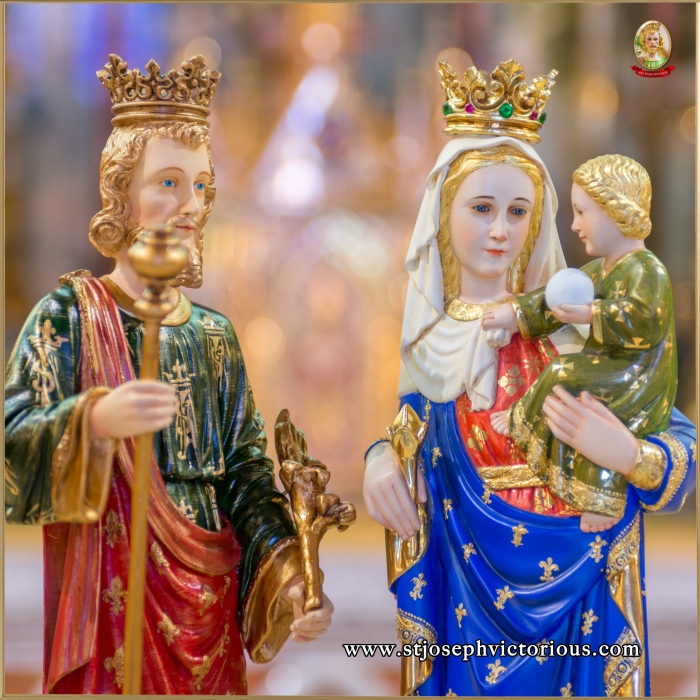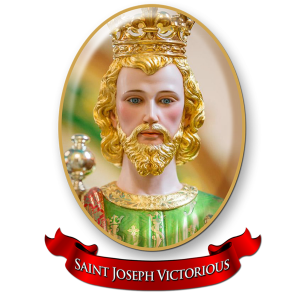
The Solemnity of the Annunciation of the Lord is a most beautiful occasion to celebrate the restoration of harmony in the universe. It is the commemoration of the day in which creation began to shine with an entirely divine brilliance, through the merits of Mary Most Holy.
A position of humility and admiration
Jacob was the father of Joseph, the husband of Mary. Of her was born Jesus Who is called the Christ. Now this is how the birth of Jesus Christ came about. When his Mother Mary was betrothed to Joseph, but before they lived together, she was found with child through the Holy Spirit. Joseph her husband, since he was a righteous man and unwilling to expose her to shame, decided to divorce her quietly.
(Mt. 1:16, 16)
St. Matthew’s narrative highlights what was previously stated, for it reveals the honesty and unshakeable faith of St. Joseph in face of the greatest difficulties. Frenzy held no sway in his soul — an example for a world that worships agitation and restlessness. Indeed, the lives of the Saints unfold calmly and serenely, even amidst trials. When they suffer setbacks, they reflect, make a decision, and go forward without losing peace of soul.
Joseph “was righteous,” and when he saw that Mary was with child he entertained no suspicions regarding her purity, for he knew her very well and “believed more in the chastity of his spouse than in what he saw with his own eyes, more in grace than in nature.” Meanwhile, as one who cherished and fulfilled the Law — as is proved in other Gospel episodes — he found himself obliged to publicly or privately repudiate or to denounce her, handing over to death one whom he knew to be entirely innocent. He could, conversely, have kept her with him, refraining from accusing her, and assuming her child as his own, but he was not favourable to this option, considering himself unworthy of such a lofty and extraordinary happening. Thus, not understanding what was taking place with her, he adopted an immediate stance of humility and inferiority. He put everything in God’s hands, accepted the humiliations, and decided to withdraw secretly before the situation were to become manifest, as if to say: Domine non sum dignus.
You have been found worthy!
Such was his intention when, behold, the Angel of the Lord appeared to him in a dream and said, “Joseph, son of David, do not be afraid to take Mary your wife into your home. For it is through the Holy Spirit that this child has been conceived in her.
(Mt. 1:16, 20)
Prepared to leave and crushed by sorrow, he received a revelation from an Angel: the fruit of Mary Most Holy bore within her was God Himself made Man, and she would be Mother without ceasing to be Virgin! As for him, contrary to what he thought, he was indeed worthy of his heavenly spouse, becoming on of the first to know the sacred mystery of the Incarnation of the Word.
You will be the Child’s father
She will bear a son, and you are to name Him Jesus, for He will save his people from their sins.
(Mt. 1:16, 21)
Consolation and awe must have inundated St. Joseph as he learned that he was associated with this mystery and to hear from the Angel that it was his duty, as the patriarch and lord of the home, to name the Child. Just as God the Father had named the Second Person of the Blessed Trinity in His eternal generation, calling Him Saviour — for Jesus means he who saves — Joseph would also denote His mission with respect to His temporal birth, assuming, by a special divine concession, a human role analogous to that of the Eternal Father. In this regard, the pious Fr. Isidore Isolano comments: “Parents customarily have the authority to name their children. As Jesus was the Son of God, St. Jospeh would do this in place of the Heavenly Father. When princes are baptized — the occasion when Christians name their children — who wold customarily stand in the parents’ place for giving the name, if not another king, ambassador or other high dignitary? In a similar circumstance for the Heavenly Father, no one appeared to Him as pleasing, as worthy and as eminent as St. Joseph.” Thus, the prophecy that the Messiah would be the Son of David would be entirely fulfilled; He would be so by both the father and the Mother.
Msgr. João Clá Dias, New Insights on the Gospels Solemnities, p. 45-47
